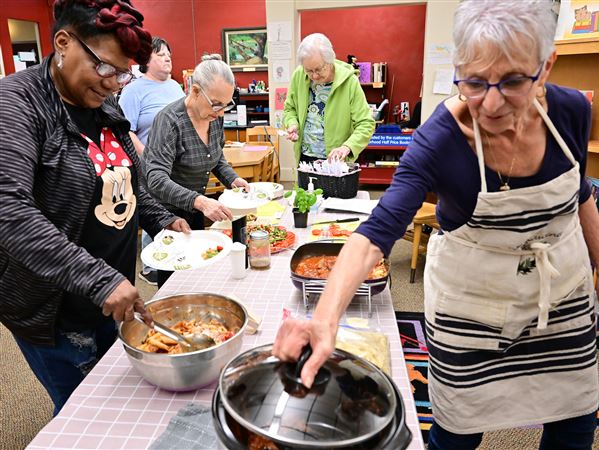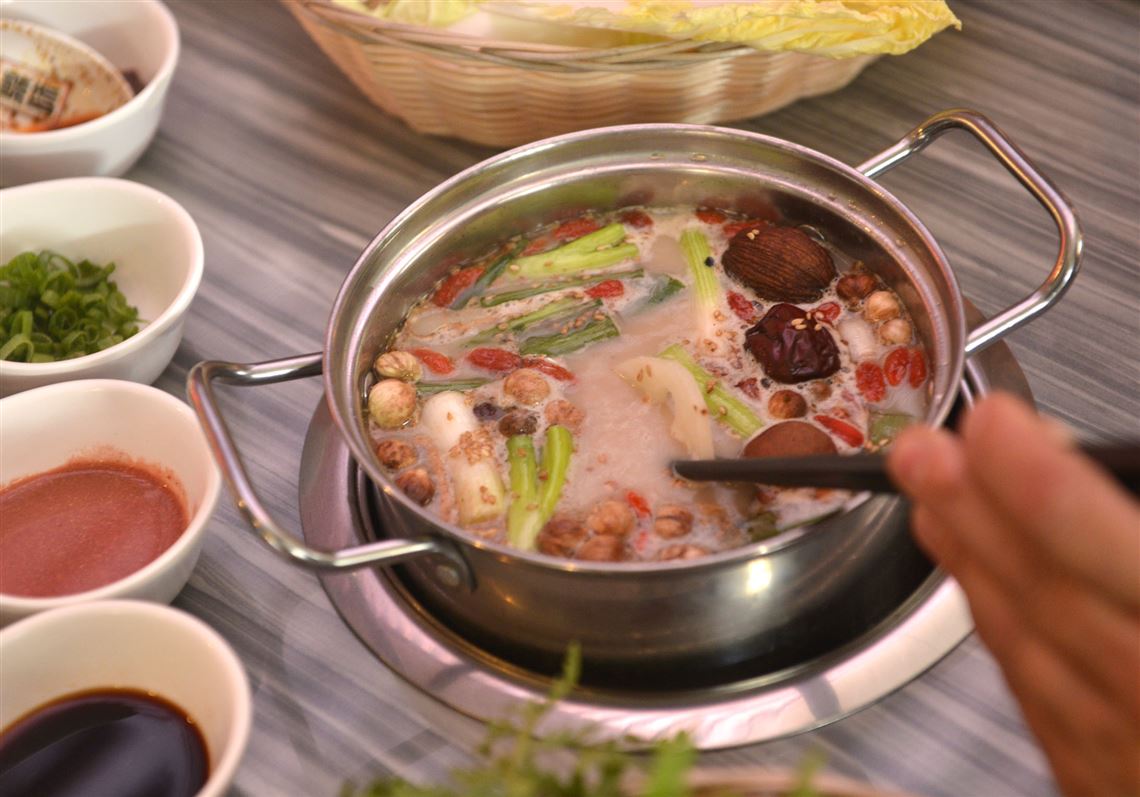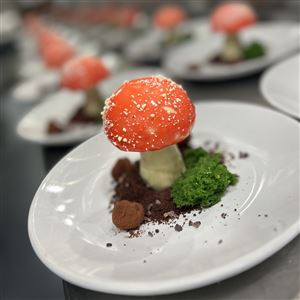The influx of Asian students to Pittsburgh universities is one of the most important factors shaping Pittsburgh's restaurant community. Not only is it bringing to the city more Chinese, Korean, Indian and Asian-fusion eateries, it is also prompting some restaurant owners to shape menus according to students' cravings.
In 2010, Carnegie Mellon University and the University of Pittsburgh each had close to 800 Chinese students, according to school enrollment reports. Today, at those two schools the number of students from all over Asia has doubled.
According to the 2015 University of Pittsburgh Fact Book from the Office of Institutional Research, 2,315 Asians attend the university (the numbers aren't broken down by country of origin.) And at Carnegie Mellon, more than 3,000 students from Asia were enrolled in a graduate or an undergraduate program in 2014; just more than 1,770 were from China, 1,168 from India and more than 300 from South Korea.
From just two of the handful of universities within the city, that's more than 5,000 Asian students who, like Pittsburghers out in the diaspora, often crave foods from home.
Beyond providing low-cost items for students on a budget, many restaurants are offering authentic regional cuisine as a separate menu or a subset of an expansive menu of Asian dishes. And as many restaurants cater to millennials and an even younger set, restaurants are diversifying menus so students can have it their way.
Such is the case at Top Shabu-Shabu in Oakland (114 Atwood St., 412-879-1555). It's a Japanese-named, Chinese-owned restaurant that specializes in Chinese hot pots and Korean barbecue. When nearly every restaurant in Pittsburgh had stopped serving dinner after 9 p.m. on the Sunday after July 4, it was still going strong.
Top Shabu-Shabu also is a bit perplexing because it's such a fusion of traditions -- part Japanese, part Chinese, part Korean -- with a heavy reliance on make-your-own flavors.
The restaurant is modeled after similar concepts in New York City, such as 99 Favor Taste, an all-you-can-eat restaurant that opened last year on the Lower East Side.
Unlike that restaurant, Top Shabu-Shabu isn't all you can eat, yet it's similar in that diners sit at tables with a warming burner at each place setting and a central electric grill. And it is inexpensive.
The menu is a grid that arrives with a pen. Start by choosing from one of three broths --- I prefer vegetarian or spicy versions. Order between one and three meats or seafood, from pig blood or tendon to sausage and fatty beef, mussels, shrimp or crab. Add vegetables from chrysanthemum greens to Chinese yams to sweet corn. And don't forget noodles or fried tofu skins.
As I waited for dinner on one of my recent visits, a Japanese server from South Carolina, who is a student at Pitt, brought plates, chopsticks and little bowls for mixing sauces, along with tongs, scissors for cutting meat and a brush for marinading meats.
Unlike a straight-up Korean place, only one plate of banchan arrived, and it was kimchi, the pickled cabbage that's a staple of Korean cuisine. Otherwise, don't expect little bites of seaweed, pickled cucumber or boldly seasoned squid. And when it comes to meat, you will find pork belly, but the menu diverges from standard cuts that a Korean barbecue regular would recognize. Instead, it was pork chops and lamb chops and medallion-cut sausages.
As a server prepped the table, I visited the condiment bar and filled little bowls with sesame seed oil, scallions, cilantro, vinegars, hot chili paste, sugar, salt and MSG. I ended up with five bowls that looked like a mise en place by the time I aligned them at the table. My server said he puts together one or two more complex "sauces" by combining a handful of ingredients in one of the larger bowls that arrive with the plates.
When the broth arrived, we were told not to eat the nuts that bobbed in the metal bowl, which, as it turns out, are camphor seeds, an aromatic that is likened to eucalyptus and sassafras.
I turned up the burner so the stock rolled just past a simmer. In the meantime I also turned up the grill and started the meats, which were painted with marinade by a server when he stopped by the table.
I sipped Sapporo in between grabbing slices of lotus root, breaking off fried tofu skins from larger sheets and dipping them into the broth along with mushrooms, greens or fatty beef.
Dip, swish, eat. Dip, swish, eat. It's the rhythm of hot pots in many cultures. Usually it's done in a communal pot; here it was a serving for one.
Sometimes my friend and I would end up with chopsticks full of simple, seasoned greens. Sometimes, it was a salty, sweet and savory bite of beef covered in a dipping sauce. A less than delicious bite reinforced that the chef isn't establishing flavors by preparing dishes: diners are, through condiments or the concentrated flavors of a reducing broth.
"This reminds me of pouring all the fountain sodas in one cup at a Wawa stop," said a friend. When mixing ingredients on the fly from the condiment bar, some misses aren't that far off.
Still, I like the place. With students drinking blue cocktails or beer and hanging out for longer than the average turn and burn restaurant, there's a liveliness, with diners joining other tables to ask about orders and sample each others' creations.
Among other local restaurants catering to Asian college students, in particular, are:
* In Squirrel Hill, Sakura Teppanyaki & Sushi (5882 Forbes Ave.; 412-422-7188) owner Ping Geng has recruited chefs from Xi'an in northwest China. They arrived a few weeks ago and will offer foods from that region, namely, hot-oil noodles, spicy cabbage and a street food that's like an omelet that serves as a sandwich stuffed with meats. The menu will change often, Ms. Geng said.
* Everyday Noodles in Squirrel Hill (5875 Forbes Ave.; 412-421-6668) has been working with the Taiwanese government to rotate cooks from the region since the restaurant opened in 2013. Owner Mike Chen and his son Allen are planning on opening a second location in Cleveland.
* Sichuan Gourmet in Squirrel Hill (1900 Murray Ave.; 412-521-1313) offers cooking from the Sichuan province, delivering more than 150 boxed lunches to Carnegie Mellon a day that cost about $7 apiece. The restaurant is so popular it is in the process of opening a second location at 328 Atwood St. in Oakland this summer.
* Two other Squirrel Hill spots from Mike Wu and family, Pink Box Bakery Cafe (2104 Murray Ave.; 412-422-2138) and Ramen Bar (5860 Forbes Ave.; 412-521-5138), will open second locations in Oakland, close to the fast-casual second location of Rose Tea Cafe (412 S. Craig St.; 412-226-9118) opened a couple of years ago. Rose Tea Cafe (5874½ Forbes Ave.; 412-421-2238) in Squirrel Hill is the family's first restaurant.
A few places expect that sales will drop off in the summer when students leave town. Since no one is answering phones, it's unclear why Nak Won Garden in Friendship (5504 Centre Ave.; 412-904-4635) has closed through July 30, but that is the lean time for college students here.
While Chinese, fusion and Indian restaurants have opened close to the universities, Thai restaurants are opening in more residential locations away from stretches where students live, such as Thai Touch Kitchen in Mt. Lebanon (665 Washington Road; 412-892-9517) or Asiatique Thai Bistro in Bakery Square in Larimer (120 Bakery Square Blvd.; 412-441-1212). These restaurants speak to a growing Thai community, but they're catering to residents who aren't necessarily affiliated with the schools.
Melissa McCart: 412-263-1198 or on Twitter @melissamccart.
First Published: July 9, 2015, 4:00 a.m.

















